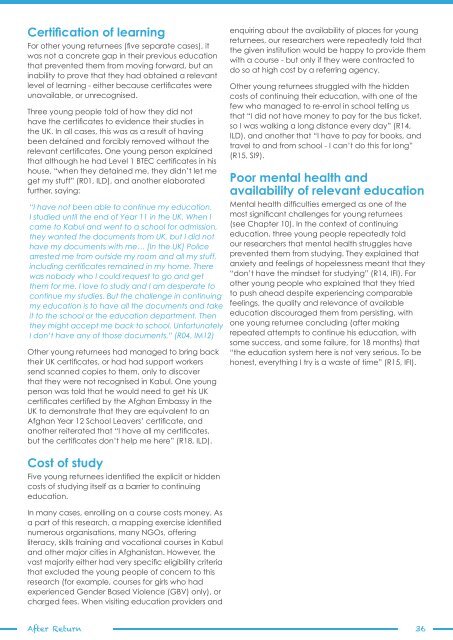After Return
After%20Return_RSN_April%202016
After%20Return_RSN_April%202016
Create successful ePaper yourself
Turn your PDF publications into a flip-book with our unique Google optimized e-Paper software.
Certification of learning<br />
For other young returnees (five separate cases), it<br />
was not a concrete gap in their previous education<br />
that prevented them from moving forward, but an<br />
inability to prove that they had obtained a relevant<br />
level of learning - either because certificates were<br />
unavailable, or unrecognised.<br />
Three young people told of how they did not<br />
have the certificates to evidence their studies in<br />
the UK. In all cases, this was as a result of having<br />
been detained and forcibly removed without the<br />
relevant certificates. One young person explained<br />
that although he had Level 1 BTEC certificates in his<br />
house, “when they detained me, they didn’t let me<br />
get my stuff” (R01, ILD), and another elaborated<br />
further, saying:<br />
“I have not been able to continue my education.<br />
I studied until the end of Year 11 in the UK. When I<br />
came to Kabul and went to a school for admission,<br />
they wanted the documents from UK, but I did not<br />
have my documents with me… [In the UK] Police<br />
arrested me from outside my room and all my stuff,<br />
including certificates remained in my home. There<br />
was nobody who I could request to go and get<br />
them for me. I love to study and I am desperate to<br />
continue my studies. But the challenge in continuing<br />
my education is to have all the documents and take<br />
it to the school or the education department. Then<br />
they might accept me back to school. Unfortunately<br />
I don’t have any of those documents.” (R04, IM12)<br />
Other young returnees had managed to bring back<br />
their UK certificates, or had had support workers<br />
send scanned copies to them, only to discover<br />
that they were not recognised in Kabul. One young<br />
person was told that he would need to get his UK<br />
certificates certified by the Afghan Embassy in the<br />
UK to demonstrate that they are equivalent to an<br />
Afghan Year 12 School Leavers’ certificate, and<br />
another reiterated that “I have all my certificates,<br />
but the certificates don’t help me here” (R18, ILD).<br />
enquiring about the availability of places for young<br />
returnees, our researchers were repeatedly told that<br />
the given institution would be happy to provide them<br />
with a course - but only if they were contracted to<br />
do so at high cost by a referring agency.<br />
Other young returnees struggled with the hidden<br />
costs of continuing their education, with one of the<br />
few who managed to re-enrol in school telling us<br />
that “I did not have money to pay for the bus ticket,<br />
so I was walking a long distance every day” (R14,<br />
ILD), and another that “I have to pay for books, and<br />
travel to and from school - I can’t do this for long”<br />
(R15, SI9).<br />
Poor mental health and<br />
availability of relevant education<br />
Mental health difficulties emerged as one of the<br />
most significant challenges for young returnees<br />
(see Chapter 10). In the context of continuing<br />
education, three young people repeatedly told<br />
our researchers that mental health struggles have<br />
prevented them from studying. They explained that<br />
anxiety and feelings of hopelessness meant that they<br />
“don’t have the mindset for studying” (R14, IFI). For<br />
other young people who explained that they tried<br />
to push ahead despite experiencing comparable<br />
feelings, the quality and relevance of available<br />
education discouraged them from persisting, with<br />
one young returnee concluding (after making<br />
repeated attempts to continue his education, with<br />
some success, and some failure, for 18 months) that<br />
“the education system here is not very serious. To be<br />
honest, everything I try is a waste of time” (R15, IFI).<br />
Cost of study<br />
Five young returnees identified the explicit or hidden<br />
costs of studying itself as a barrier to continuing<br />
education.<br />
In many cases, enrolling on a course costs money. As<br />
a part of this research, a mapping exercise identified<br />
numerous organisations, many NGOs, offering<br />
literacy, skills training and vocational courses in Kabul<br />
and other major cities in Afghanistan. However, the<br />
vast majority either had very specific eligibility criteria<br />
that excluded the young people of concern to this<br />
research (for example, courses for girls who had<br />
experienced Gender Based Violence (GBV) only), or<br />
charged fees. When visiting education providers and<br />
<strong>After</strong> <strong>Return</strong> 36


